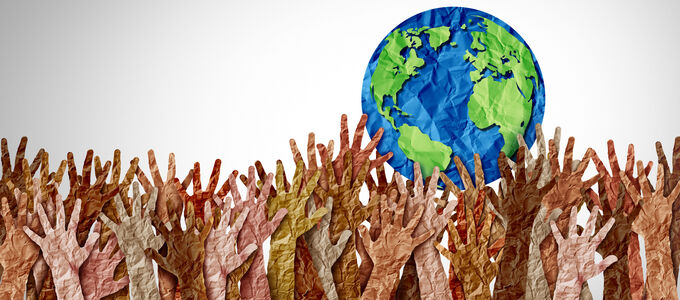Lead the way: International Day for Tolerance 2021

“You may say I’m a dreamer, but I’m not the only one. I hope someday you’ll join us and the world will be as one.” John Lennon wrote these words, and the song has become a classic. The concept of tolerance has also aged. The sheen has gone. Here are some thoughts on the International Day for Tolerance.
“Tolerant people are fools,” is the opinion of the impatient, the small-minded, and the inconsiderate. They are too diplomatic, too vague, too considerate. Maybe, but one can look at it in a different light. Because sometimes it takes negation to decide which side one wants to be on. Of course, I don’t want those around me to see me as a tyrant, unless I really am one. And even they are hypocrites and pretend to be friendly. On the other hand, terms like forbearance, generosity, good-naturedness, leniency, consideration, and understanding are less and less part of everyday vocabulary.
Possibilities and limits
There is simply far too much happening in the world that we can even begin to fathom any more. “I can’t handle this any more; I can’t stand it.” There are situations that leave one agape in dismay and disbelief. The pain is too great, the dispute too violent, the hostilities too bitter. Life is sometimes hard to take. Thank God, however, that this kind of fate does not have to be tolerated all too often. At least not if we understand “tolerance” in the conventional sense. According to this, people are tolerant if they treat each other indulgently, respectfully, and with kindness. Especially if they are different, think differently, talk differently, look differently… Anyone who allows other people their own opinions and respects their way of life has understood the basics of tolerance. And yet they are doing nothing more than fulfilling the commandment of Christian love.
Of course, the question must be asked: can there be limits to such tolerance? Yes, clearly, for example when human rights are violated, when hatred is spread, war fomented, violence sown, and the fundamental right of freedom of others is restricted. Mockery, rejection, apartheid, segregation, slavery, religious wars are well-known anti-facts of tolerant action of modern times.
There have always been excesses of selfishness or feelings of superiority. And Jesus Christ fights against this. He is one of the few voices who authentically and consistently proclaim and implement their idea of neighbourly love. He elevates the old rule of being kind and benevolent and treating others as you want them to treat you to a postulate.
New trends in intolerance
Even in our modern society today, there are many issues that lead to intolerance: the vaccinated versus the unvaccinated, the right versus the left, political agendas for or against climate change, social media attacks—depending on how they are interpreted, they do not leave people unscathed. When something is interpreted too narrowly or too broadly, people like to look for faults in others or play the blame game. Often enough, people forget that objective facts are hardly heard in emotional discussions. For communication is not only what is said, but also what the other person hears.
Tolerance can be learned
Being tolerant is not always easy, but it can be learned. A kind of toolbox is to ask yourself the right questions. Where do I have concrete problems with tolerance? Against whom or what are my prejudices directed and why do I have these prejudices in the first place? Am I still curious enough about other opinions? Do I approach strangers openly? What is my attitude towards myself, towards my biography, towards my own attitudes? Are they the dogma that my actions are based on?
In the end, we need to be tolerant with ourselves. Nobody is perfect. Everybody has faults. Adults and children, the stupid and the smart, the rich and the poor. They all have faults and all make mistakes, even if we don’t recognise them all. The important thing is to accept oneself. A strong personality can acknowledge other people without having to fear of falling off their own pedestal.
Lead the way!
Taking a stance against intolerance aims at the same principle that Jesus already practised: don’t pay back in kind, but treat others as you yourself would like to be treated. Reflect on your behaviour, be respectful, empathetic, patient, open to discussions, open to other people and cultures, working together to find a solution: “You may say I’m a dreamer, but I’m not the only one. I hope someday you’ll join us and the world will be as one.”
Background on the International Day for Tolerance
On 16 November 1995, UNESCO’s Member States adopted a Declaration of Principles on Tolerance. The declaration affirms that tolerance is respect and appreciation of the rich variety of our world’s cultures, our forms of expression and ways of being human. Without tolerance there can be no peaceful co-existence.
Article 6 of this declaration designates November 16th as the annual International Day for Tolerance: “In order to call upon the public, emphasise the dangers of intolerance, and react with renewed commitment and action in support of tolerance promotion and education, we solemnly proclaim 16 November the annual International Day for Tolerance.”
Photo: freshidea – stock.adobe.com




